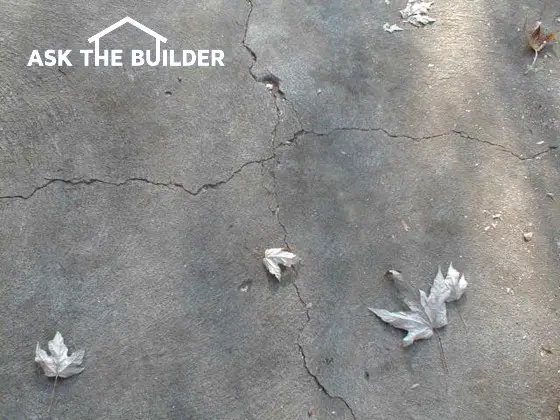Concrete Crack Prevention

Concrete Crack Prevention
DEAR TIM: We are having a new concrete driveway installed. What can be done to prevent cracks in the new surface? Is it realistic to expect the surface to last for 25 to 30 years with no maintenance? How thick would you pour the drive? Would you install any steel reinforcing? Does the driveway need to be sealed once it is poured? Maria B., Janesville, WI
DEAR MARIA: Concrete is a wonderful driveway surface. If your driveway is installed by a seasoned professional, then your driveway should easily last 30 years. In fact, I have seen concrete driveways in my town that are nearly 50 years old that are still in good condition. Long lasting, crack free concrete does not happen by accident. It must be ordered correctly, installed with great care, finished properly, and cured carefully.
Cracks are to be expected in new concrete. Professional concrete masons realize this fact and take measures to minimize their appearance. Concrete is very strong if you try to squeeze or compress it. But if you try to stretch it or bend it, it usually only exhibits 1/10th the strength that it possesses when you compress it. If the new concrete in your drive is poured over soft, uncompacted soil, your car or a heavy delivery truck will bend and crack the concrete as it passes over the soft spot. This is why concrete needs to be poured on solid, compacted soils.
Concrete also shrinks as it dries and hardens. It can shrink about 1/16th of an inch for every ten feet of length. This shrinkage creates tension within the concrete that tries to tear it apart. Professionals who install concrete driveways install crisp tooled lines in the slabs. These are called control joints. The lines act as pre-weakened stress points that encourage the concrete to crack at these locations. The joints can also be installed as soon as the concrete hardens by using a diamond saw that cuts the line. The control joints must be deep enough to perform their job. The minimum depth of the joint should be 1/4 the thickness of the slab.
Spacing of control joints is critical. Make sure the joints on your driveway are spaced at intervals of 15 feet or less. It is a common practice to make the spacing equal to the width of the driveway. If your driveway slab will have sharp 90 degree corners, control joints should extend from these corners out into the slab. Concrete cracks often radiate from corners, so make sure you discuss the control joint layout with the contractor before the pour begins.
Thicker concrete is a good idea for driveways. I would like to see you install a minimum 5 inch thickness. Often contractors might try to tell you that a 4 inch thickness is sufficient. The cost to upgrade to a 5 inch thickness on an average driveway is chicken feed when you compare it to the total cost of the job. For example, if your driveway measures 720 square feet, a 4 inch thick pour will require 9 cubic yards of concrete. Increasing the thickness to 5 inches requires 11 cubic yards of concrete. The extra two yards of concrete will only cost about $130.00. (1999 pricing - adjust for inflation)
Reinforcing steel is a must in my opinion. Steel is very inexpensive and it helps to strengthen the concrete significantly. Steel will hold cracked slabs together. Without steel, cracks can grow in size and you can get offsets where one part of the slab is higher or lower than an adjacent piece. Steel needs to be placed no more than 2 inches down from the top of the slab for maximum performance.
Concrete that has been ordered with enough cement so that it is a 6 bag mix (564 lbs of cement) or a 4,000 pounds per square inch design strength, contains just enough mix water to give it a 4 inch slump consistency, is finished without the use water, and is moist cured with plastic or with a liquid curing compound should not have to be sealed.
If your concrete driveway is poured correctly, the surface will withstand cold weather, deicing salts, vehicle traffic, basketball games and tricycle road races for many years. Weak concrete that has been ordered and installed improperly needs to be sealed with high quality silane or siloxane water repellents. Do not use film-forming silicone sealers.
Want perfect concrete work? Find a pro by using my Concrete Work (Sidewalks, Driveways, Patios & Steps) Checklist. I offer a 100% Money Back Guarantee.
Author's Notes:
May, 2004
Keep in mind that the above strength rating of 4,000 psi concrete is a minimum standard. There is no reason why you can't order concrete that is 4,500 or even 5,000 psi. It will cost slightly more simply because they are adding more cement per cubic yard. But if you expect the concrete to be subjected to harsh conditions, this extra cement could extend the useful life 25 to even 50 more years!
Column 293
7 Responses to Concrete Crack Prevention